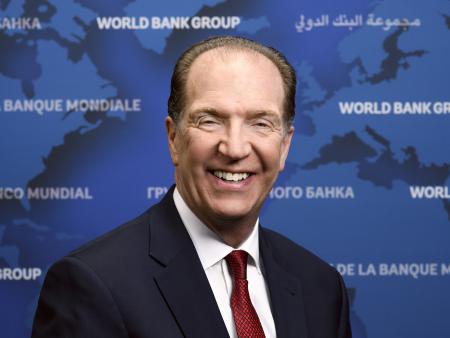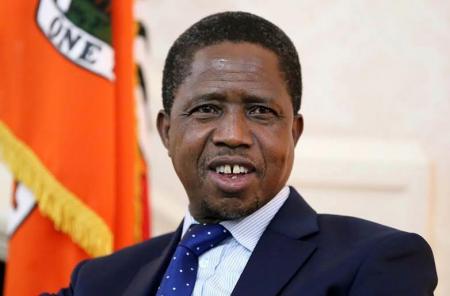Investing in Climate and Environment Key Steps in Reducing Extreme Poverty and Boosting Shared Prosperity – World Bank President
PRESS STATEMENT
- FOR IMMEDIATE RELEASE -
Washington D.C., Thursday, 3rd October 2019 – World Bank President David Malpass says investing in the climate and the environment were key steps in reducing extreme poverty and boosting shared prosperity among nations. Malpass said the Bank’s Group activities would address climate and environmental challenges and were reflected in the investment of billions of United States dollars to support climate related investments and projects.
To underscore significance that the World Bank placed on climate change, its effects and the Group’s response, the World Bank Chief said the Bank planned to “showcase the importance of biodiversity at the Annual Meetings in Washington D.C at an event on October 17, 2019 called “Invest in Nature: Uncovering the Hidden Value of Biodiversity.”
Malpass, in giving a peek into the Annual Meetings and highlighting greater value of tackling climate change in development wrote in his blog: “Our climate and environment projects unlock new growth and investment opportunities, create jobs and make economies more resilient. It’s important to change mindsets and lead the way.
David Malpass was selected as the 13th President of the World Bank Group by the Bank’s Board of Executive Directors on April 5 2019. His five-year term began on April 9, 2019. Mr. Malpass previously served as Under Secretary of the Treasury for International Affairs for the United States.
Malpass said that in 2018 alone, the World Bank Group committed $17.8 billion to climate-related investments.
“We also have a major portfolio in other environment-related projects. In December, we announced new climate targets for fiscal year 2021-2025, committing to double to $200 billion the amount we invest and mobilize. We’re already the biggest single funder of climate and environment investments, and we’re ramping up. In fiscal year 2019, 30 percent of commitments by the IBRD (International Bank for Reconstruction and Development) and IDA (International Development Association) included climate co-benefits, surpassing our target,” Malpass said.
He cited several interventions the World Bank was already supporting. They included Climate-smart agriculture, renewable energy, sustainable cities and harnessing the power of digital technologies which can be used to assess natural hazards in cities around the world and help map people and assets and analyze climate and disaster risks in order to plan and finance more resilient cities.
” Climate-smart farming is critical to helping farmers adapt to challenging growing conditions. Better agricultural practices are also key to protecting biodiversity. Climate-smart agriculture will feature as part of the mix of solutions discussed at the Annual Meetings at an event called “The Future of the Rural Space” on October 16,” Malpass said adding that working with the Consultative Group for International Agricultural Research (CGIAR), the World Bank was stepping up agricultural research in Africa, with a strong focus on drought-resistant seeds. Zambia was in line to benefit from these initiatives. The country is among those facing the brunt of climate change effects which have impacted hydro-power generation and food production particularly in drought prone regions which were facing food shortages because of prolonged drought.
“We’ll work with our partners in Africa to develop a new IDA financing package of $60 million. Together with our ongoing contributions to CGIAR, we expect to provide agricultural research support through this mechanism on the order of $150 million over the next three years,” he said.
Earlier this year, the World Bank launched the Adaptation and Resilience Action Plan, which focused on three main areas: boosting the Bank’s own adaptation financing to $50 billion; helping countries adapt so that climate risks were managed at every phase of policy planning, investment design, and implementation; and developing a new rating system to create an incentive for investments in adaptation and resilience, and to improve tracking.
In boosting climate-smart agriculture through renewable energy, The World Bank was helping countries accelerate their energy transition and deliver sustainable, reliable, affordable energy. Zambia was already benefitting from the IFC – International Finance Corporation - financed worldwide solar power projects implemented in more than 15 countries. Scaling Solar, a joint IFC and World Bank program, was expanding to five countries in Africa and one in Central Asia. In Zambia alone, Scaling Solar had added 88 megawatts of power to the national grid.
Climate change has impacted on rainfall patterns, brought droughts, and is negatively affecting both large and small business development in Zambia and across Africa and the world. President Edgar Chagwa in opening the fourth session of the 12th National Assembly themed his address “Accelerating Sustainable Development For A Better Zambia Amidst The Impact Of Climate Change”.
President Lungu said as a result of climate change effects, “our country is facing a very serious problem”, a situation he said needed to be tackled head-on.
A grave challenge, climate change was the headline agenda during the UN General Assembly in New York and as intimated by Malpass will be central at the coming annual meetings to be held in Washington D.C from October 14 to 20.
Issued by:
Eric Mwanza
First Secretary – Press & Public Relations
Embassy of the Republic of Zambia
Washington D.C.




